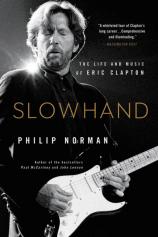Slowhand: The Life and Music of Eric Clapton
Review
Slowhand: The Life and Music of Eric Clapton
It is often forgotten --- if thought of at all --- that a work of art in any medium is the very tip of the creative spear possessing quite a long shaft. This is especially true of a book or a sound recording. Think of the artist as a motorist stopped at the entrance to a roundabout that has six (or more) exits, with no idea of which one to take. The artist may take one, stop, retrace steps, and take another until he gets where he wants to go, or at least thinks he wants to go. It’s a bit of a gamble, timewise, which the artist must be willing to make in order to reach the illusionary goal of success, however that might be defined.
Biographies of musicians, actors and authors are of particular interest because of the manner in which those practitioners are thrust, often suddenly, into the public limelight. British novelist and playwright Philip Norman is uniquely qualified to have written biographies of several major British rock stars, including John Lennon, Paul McCartney, Mick Jagger and Elton John. Norman is a contemporary of those personalities, having been a part (as a spectator and journalist) of the British scene in which they all developed in the late 1950s and early ’60s. His latest effort, SLOWHAND, focuses on the life of Eric Clapton. While others have plowed this ground before, Norman manages to coax some fertility out of it even at this late date as the result of his lifelong access to the man and his contemporaries.
"SLOWHAND is neither a slavish love letter nor a hatchet job. The subject matter is more complicated than one might expect and thus all the more interesting."
SLOWHAND is neither a slavish love letter nor a hatchet job. The subject matter is more complicated than one might expect and thus all the more interesting. Clapton’s conception was the result of an assignation between his mother and a Canadian serviceman stationed near the village of Ripley, England, in the months leading up to World War II. Clapton never knew his father, while his mother left both him and his half-brother in the care of their maternal grandmother, Rose, when he was just two years old. Grandparents are known to occasionally spoil their grandchildren, and Clapton raised that behavior to an art form. When he wanted a guitar before he even entered his teens, Rose made it so, and the instrument rarely left his hands.
Clapton’s future was set when he was asked to join a fledgling but popular group, The Yardbirds, while still in his teens. This union was auspicious for two reasons: Clapton acquired the nickname --- initially a jibe --- of “Slowhand” during this period, and was aboard for the recording and release of the album Five Live Yardbirds, which is arguably the best (and most poorly recorded) live performance of a rock band ever made, so much so that it stands up superlatively 55 years later. Clapton’s acrimonious departure from the band came on the eve of its international success but was followed by turns in John Mayall’s Bluesbreakers (with bass guitar duties handled by a dour-faced youngster named John McVie), the short-lived Powerhouse, and a band called Cream.
Clapton’s short tenure in each was a product of his artistic restlessness, which later sought release in the prodigious use of drugs and alcohol. This, coupled with his star status and appeal to women, resulted in a series of destructive actions that were noteworthy for the wide path they cut and the collateral damage carelessly inflicted upon those around him. Clapton’s substance-induced Pollyanna attitude --- and his conquest of it --- makes for fascinating reading in Norman’s hands, all the more so if the reader is of a certain age and has followed his musical career from afar.
Clapton still performs, even after all these years. He resides for part of the year in a suburb less than 20 minutes from where I sit typing (his in-laws live nearby), and sightings abound, from picking up the goods at a local dry cleaner to generously making a surprise appearance at a local musicians’ benefit show. His quiet recovery did not come without great personal cost; as we should know by now, success does not make one immune to tragedy. All of it is told in SLOWHAND, and told well.
Reviewed by Joe Hartlaub on November 30, 2018
Slowhand: The Life and Music of Eric Clapton
- Publication Date: November 19, 2019
- Genres: Biography, Music, Nonfiction
- Paperback: 448 pages
- Publisher: Back Bay Books
- ISBN-10: 0316560464
- ISBN-13: 9780316560467




